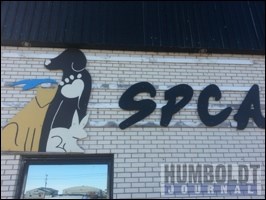They are fairly common sights in Humboldt, and for that matter just about anywhere: a dog tied up in a backyard or a cat perched on a front stoop. Normally that's not a problem, but the local SPCA is lobbying for a new bylaw to penalize owners who leave their dogs outside during periods of extreme cold or heat without proper food, water, and/or shelter.
Humboldt's current Dog and Cat Control Bylaw provides for fines ranging from $100 to $300 for allowing a dog or cat to be "at large", or loose; for failing to clean up after a pet; and for having a pet that creates a nuisance for others by making noise. The bylaw does not provide penalties for owners who leave their pets outside in extreme weather and, according to Wanda Price of the Humboldt SPCA, that's a problem.
"One of the main things we'd like to see is that people wouldn't be able to keep their dogs tied up outside 24/7," Price said. "At -15 degrees the dogs should have to go inside or have a proper shelter with straw, for example."
Price came upon the idea of a new bylaw after receiving many calls this winter about a puppy that was being kept outside for an extended period of time.
"I went there a few times and talked to the owner, but nothing really changed," Price said. "The dog outgrew its house during the winter but was still out there. The neighbours would call me almost crying, upset to hear the dog whining and hopping from foot to foot trying to stay warm."
Some of those contacted for this article made the point that existing laws already deal with the problem and enacting a new local bylaw would not be an effective solution. There is both provincial and federal legislation dealing with animal welfare that covers the types of situations Price is referring to: the Animal Protection Act became law in Saskatchewan in 1999, and several sections of Canada's Criminal Code deal with the issue. Penalties range from fines to jail time, and leaving an animal outside in extreme cold or heat could qualify as a breach of the legislation.
"The laws talk about an animal being in distress, and that dog was definitely in distress," Price said.
Even if an offence is being committed, though, the biggest hurdle can be enforcement. Only RCMP officers or animal protection officers from the SPCA are permitted to enforce the relevant laws. There are no animal protection officers in the Humboldt area - there are only four in the entire province- and the local bylaw officer is not authorized to investigate such incidents.
"The problem of pets outside in the cold without water, food, or shelter is not something I can control with our bylaws," Norman Mattock, Humboldt's bylaw officer, said in an email.
"We could investigate something like that under the terms of the Criminal Code," said staff sergeant Phil Wilson of the Humboldt RCMP.
Even if a complaint is lodged with the RCMP, though, it's not as easy as going out and seizing the animal in question.
"There are hoops we have to jump through," Wilson said. "We need a veterinarian to say that the animal is in danger or neglected. We can't just look over the fence and say, 'That doesn't look right.' We need an expert."
If it is determined that an animal is in danger, there is still the issue of acquiring a search warrant, sometimes a lengthy process. Those sorts of delays are why Price rarely turns to the RCMP for help.
"We've been told in the past that they're busy or don't have enough staff," Price said, though she did mention a recent incident where the RCMP came with her to claim several cats from a home.
A staff member of the provincial SPCA, which is not officially affiliated with the Humboldt location, agreed that actually enforcing the laws can be difficult.
"It's a challenge that a lot of communities face," said Kaley Pugh, manager of animal protection services with the Saskatchewan SPCA. "Just because you have a bylaw doesn't mean you can seize a dog because it's found outside. You have to follow a legal process and first give people a chance to fix the situation. I imagine any bylaw would need the same provisions."
Price and SPCA President Kathleen Forrester have started a petition, are collecting signatures and hope to present their case before city council sometime in the near future. The specifics of the proposal still need to be ironed out, but its basic purpose is clear to Price.
"The main thing is that when it's very hot or very cold dogs need to be in a proper place," she said.
Pugh cautioned that a local bylaw with specific guidelines might not be the solution to the problem that Price and others are looking to solve.
"There has to be a process in place, just a bylaw wouldn't necessarily solve the problem," she said. "Overly prescriptive bylaws and regulations don't always achieve what they're intended to."
For those who support the proposed bylaw amendment, they can sign the petition available at the SPCA located on Highway 5 East.




